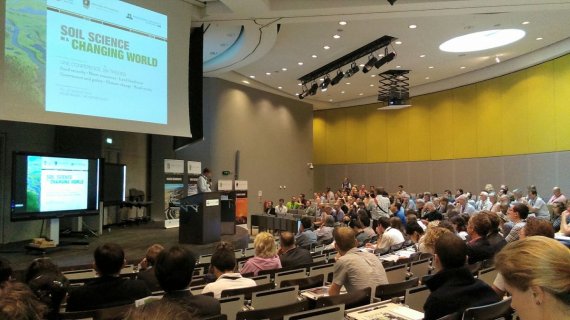This is the second time this conference has been held in Wageningen. It is attended by 230 soil scientists from 49 difference countries. For three days they are devoting their attention to such themes as food security, climate change and biodiversity, and the role of the soil in these matters.
And that is a major role, emphasized Fresco in her opening talk. The soil is often seen, according to her, as the cause of the world’s problems. The soil is exhausted, polluted, dried out, eroded, or problematic in some other way. ‘It is important to make clear to policymakers that the soil is not the cause of global problems but part of the solution.’
Jakob Wallinga, professor of Soil Geography and Landscape and chair of the conference, wholeheartedly agrees. ‘The soil does all kinds of incredibly useful things for us. At least 95 percent of our food comes from the soil, it filters our water, and it stores CO2. You need that soil if you are going to solve food and climate problems. And to do so in a way that ensures the soil is still doing those things in 100 years’ time.’
The soil is increasingly in the forefront
Jakob Wallinga
The themes of the conference are the same as those of the first edition in 2011: food security, water sources, governance and policy, climate change and biodiversity. The topic of land functions has been added. But in Wallinga’s view, you cannot look at these themes in isolation from each other. ‘Food security, for instance, has a lot to do with climate change. If you want to improve the one, you’ve got to tackle the other too.’
The story of the soil, says Fresco, should be made much more visible. In lessons in primary and secondary schools, for example. Wallinga agrees entirely. ‘The soil has often been forgotten as a subject. In discussions of how to raise food production, for example, the emphasis has tended to lie on improving crops rather than improving soils. Very slowly, that is beginning to change. The soil is increasingly in the forefront of our attention. It is not for nothing that this year is the International Year of the Soil.’
And Fresco’s prayers are being answered when it comes to more attention to soil in schools. At the beginning of October the Children’s University Wageningen will be all about the soil: 150 pupils from Wageningen primary schools will hear a talk about the soil during a guided tour of the campus. This fits in with the theme of this year’s Children’s Book Week: nature, science and technology.

